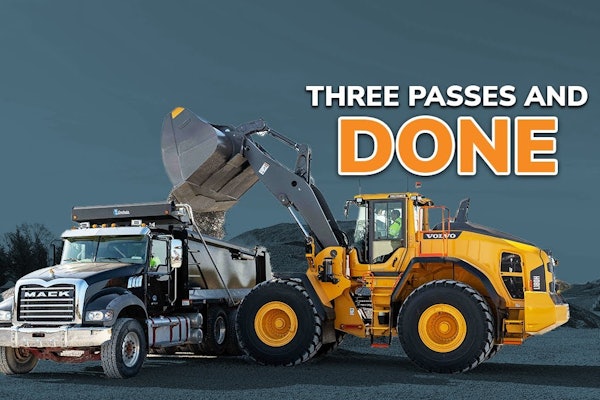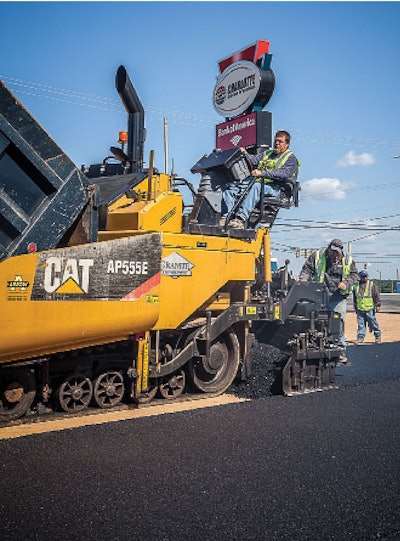
Dusting off bluetops for a highway contractor in the hot Alabama sun may not seem like the kind of job that would motivate a teenager to pursue a career in construction, but Steve Cosper loved every minute of it. “I enjoyed construction so much it changed my path in life,” he says.
His enthusiasm for construction motivated Cosper to get a civil engineering degree and then a job with the paving giant APAC where he rose through the ranks for 15 years, eventually becoming a division vice president.
But Steve had a strong desire to be his own boss and run his own paving company. So in 1999 he launched Granite Contracting with help from an investment partner. Today Granite Contracting is a turnkey site development company with nearly 80 employees, two asphalt plants and more than 100 pieces of equipment.
Beating the recession
In 2008 and 2009 when the U.S. economy sank into recession and job prospects were cut by more than half, Cosper’s ideas and practices were put to the test. North Carolina, with its big banking sector, took a heavy beating. What kept Granite Contracting afloat during these lean times was financial management – Cosper knowing his costs and working with his controller Ryan Haynes, office manager Torrie Thompson and project managers to make smart decisions.
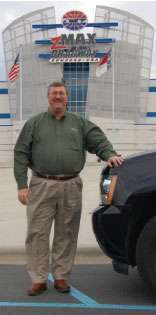 Paving the drag strip adjacent to the Charlotte Motor Speedway brought Granite Contracting praise from the racing community.
Paving the drag strip adjacent to the Charlotte Motor Speedway brought Granite Contracting praise from the racing community.“There are a lot of folks who are great construction guys, but they don’t pay enough attention to the business aspects,” Cosper says. “They don’t know what drives their profitability and they don’t put processes in place to monitor that. We know our costs down to the penny. If you asked me how much stone we ran from a particular quarry from 2 to 4 p.m. on June 22 of 1999, I could tell you. We carry it out to the third decimal place. It’s easy to make sure everybody is there at 6:30 in the morning. But it’s tough to have the processes in place so that you can understand your yields and manage the material flow and all the conveying expenses. Business is risky enough without leaving holes in the plan.”
The crews
Cosper also gives credit to his foremen and crews. “They are the face the customer sees every day and the biggest reason we get a second chance with an owner. They make it happen every day in adverse weather and challenging conditions in a safe professional manner.”
Higher ed
Part of his business acumen comes from coursework Cosper took towards a MBA degree. Due to transfers and the demands of job and family, he didn’t complete the degree, but he learned enough to put in place cost controls and cost analysis systems in his own company.
“The accounting side is just half the picture,” Cosper says. “You learn to take financial information and use it in your estimates so that you are a better predictor of costs. You have to turn that into useful information to take to the bidding table.”
Another smart move Cosper made when setting up his company was to solicit an equity partner, J.T. Russell and Sons, from Albemarle, North Carolina. “That was a big help,” Cosper says. “On day one, rather than try to raise $4 million in the equity markets, we had access to bonding and capital and their asphalt plant,” he says. “It took five years off the curve when we were getting started.”
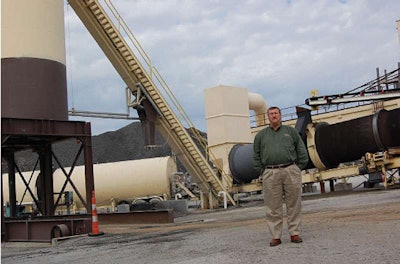 Cosper’s asphalt plant can burn four types of fuel. He chooses what's most cost effective depending on market prices.
Cosper’s asphalt plant can burn four types of fuel. He chooses what's most cost effective depending on market prices.Rigorous cost disciplines also extend to the management of the asphalt plants. The plants have the ability to use a variety of fuels, waste oil, diesel, propane and natural gas and will use whatever is least expensive at the time. Additional effeciency is found in stockpile management, material handling and yield management.
Digital technology
At the end of every week cost data is collected from every component in Granite Contracting – labor, materials, equipment and management – much of it compiled digitally via telematics, laptops and other technology tools. The data is then dumped into cost control programs and closely scrutinized. By Monday noon Cosper and his project managers have a too-the-penny look at the performance of all the jobs for the previous week and have compared it to estimates to figure out exactly where they stand. Adjustments are made swiftly to any component, machine or process that isn’t performing as expected.
In the office, they use AutoCAD, AgTek Earthwork and Bid2Win software in the preconstruction phase. In the field they have deployed Trimble GPS rovers, various truck telematics systems, Caterpillar’s Vision Link, J.D. Link and Precise MRM.
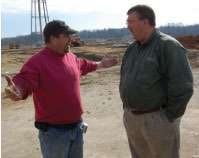 While waiting for the trucks to arrive Cosper discusses a job with paving foreman Todd Hemphill.
While waiting for the trucks to arrive Cosper discusses a job with paving foreman Todd Hemphill.Cosper says he may have gotten into the deep end of the technology pool at little early. “Instead of cutting edge it was more bleeding edge,” he says. But the early experimentation helped them refine what they needed and what they expected out of the digital product offerings.
The company sets up geofences at the asphalt plants and the jobsites to time when the trucks come and go and establish the most efficient routes. If a driver detours from the route, or sits too long at the plant, quarry or job, the project manager is notified. As with any paving operation, material delivery is a major cost component and an area of potentially big savings if you can manage and monitor it.
“We saw that the cycles we’d run at the bid table were not the cycles we saw on the cost reports and we’ve been better able to monitor those,” Cosper says. I think we’ve probably reduced our trucking expense anywhere from 10 to 14 percent with telematics. If you haul enough asphalt and stone, that’s a big number.”
On the equipment side, all Granite Contracting’s graders and most of its dozers are set up with GPS machine control. “It allows you to do more with fewer people,” Cosper says. “There are significant cost savings in the quickness and in reducing the number of people you have to have on the job.”
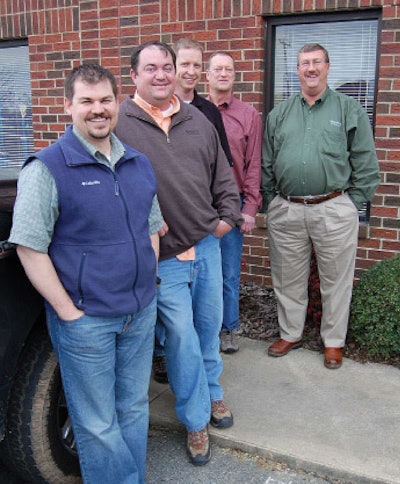 Granite’s project managers include (from back to front) Dave Yungfleisch, Brad Whaley, Hamp Hager and assistant project manager Chris Harrell.
Granite’s project managers include (from back to front) Dave Yungfleisch, Brad Whaley, Hamp Hager and assistant project manager Chris Harrell.Getting sufficient satellite signals to run GPS machine control isn’t always possible where Granite Contracting works. Trees, mountains, even tall buildings can compromise the integrity of the signals. So Cosper’s strategy is to use GPS for rough grading and then set up a total station, but still running on the same digital site model, for the final passes.
One of the biggest money savers Granite Contracting developed out of it its GPS technology is in site inspections. “Before we start any grading job we throw the GPS on a four-wheeler and run the site, just to establish a grade,” Cosper says. That clears up any discrepancies between the site plans and the reality on the ground. In the past Cosper says he’s had to move dirt that was on the ground but not on the paper and that can be an expensive oversight.
“Before we stick one bucket in the ground we resolve these disputes and get a change order upfront rather than arguing about it down the road,” he says. “It’s a big money saver – straight to the bottom line.”
PMs and performance
Cosper says Vision Link and other telematics systems Granite Contracting uses have improved the reliability of their preventive maintenance and equipment utilization. “We thought we were pretty good at scheduling PM until we got on this, and its helped more than anything else we’ve done,” he says. He also says that reports can help identify under utilized assets.
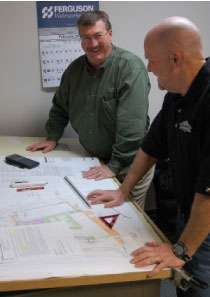 Steve Primm, vice president, was Granite’s first employee and helped Cosper with the start-up.
Steve Primm, vice president, was Granite’s first employee and helped Cosper with the start-up.The company also uses its telematics and back office software to capture direct and indirect equipment costs, performance and price history and can pull up the specs by groups or individually. “We measure every machine against the average and if one individual machine stands out, we’ll know pretty quick.” Theft prevention is also something Cosper likes about the new digital technology.
A fresh look at safety
Safety is important to any successful contractor. To Steve Cosper the most important thing about his safety program is that it be real and relevant.
Rather than use the traditional approach, which often winds up stigmatizing employees as the bad guys, Cosper believes that safety works best when it’s grounded in reality and not just for show. “Having these thick, three ring binders full of material might look impressive, but nobody reads them. They have no impact,” Cosper says. Instead, for the last 10 years he has used Robert Taylor, a safety consultant, to study his operations and make recommendations and establish common sense policies.
“We wanted to make it very specific to what we do and nothing that we don’t do. That has been a key,” Cosper says. “We tie safety performance to pay and to staying employed. New hires learn our safety expectations on a buddy system for the first six months. We don’t do things just to meet guidelines or checklists. We make it a culture. Employees are treated with respect and each employee “owns” the safety program. We want our kids’ dads to come home every night,” he says.
People skills
None of this happens without good people. And finding and keeping good people is always a challenge in construction. How does Granite Contracting meet this challenge?
“We have zero turnover,” Cosper says.
For his project managers, Cosper has frequently hired people like himself who had experience with larger paving companies, but wanted to try a better way.
In a conventional construction company one person or group does the estimating. Another group or person does the project management, another the billing. This is what some at Granite call, “over the wall management,” meaning as soon as you’re done with your portion of the work you just throw it over the wall to the next guy and forget about it. But that’s not how Granite operates.
Rather than work in isolation, Cosper’s project mangers get involved in the entire scope of a project, from estimating, bidding or selling the job; to management of the crews in the field – even to the collection of payments. “They bid it, build it and bill it,” he says.
“Pound for pound these guys are incredible,” Cosper says. “When we bid a job, we’ll pull similar jobs out of the files and do historical analysis and a very detailed estimating process. That might drive some people batty. But these guys embrace it and understand the importance. Every job we bid will have a peer review before it goes out. It takes a lot more time and we spend a disproportionate amount of money on this, but I think it’s worth every penny. It’s part of our culture,” he says.
Cosper’s entrepreneurial management style has not gone unnoticed outside the company either.
“Steve displays a keen interest in seeing that his employees grow and succeed,” says Taylor. “He often cites the specific talents or accomplishments of his supervisory and non-supervisory personnel. In doing so he sounds more like a proud parent than a CEO. Steve leads people in such a way that they want the company to succeed,” he says.
The value of a good reputation
Satisfied customers are also crucial for a company to succeed and here Granite has no shortage.
“I would want Steve Cosper to take care of my family if anything happened to me,” says Henry Batten, his friend and CEO of Concrete Supply in Charlotte. “He has more integrity in his pinky than most people have in their whole body. I use him because I know he’ll do it right. I can sleep at night and not have to ask him the price. Sometimes you walk away thinking, ‘Did I pay him enough?’”
In late 2007 Granite Contracting won the bid to pave the asphalt racing lanes and the parking lots at the zMax Dragway adjacent to the Charlotte Motor Speedway. Despite a shortened construction schedule, numerous in-progress changes, and specs on the racing strip that were tighter than airport runway specs, Granite finished the job in time for the NHRA Nationals nine months later.
“In addition to the magnitude of work that had to be completed in a short period of time, their attention to detail was impeccable,” says Jeff Black, of Speedway Motorsports. “Track smoothness is critical to drag racing and Granite exceeded our stringent specifications. Both drivers and crew chiefs have said that the zMax Dragway is the smoothest track on the circuit.”
Perhaps nobody knows better how to value a contractor than the guy who stands the most to lose if the company fails. This is often the bonding agent. Granite’s bonding agent, Timothy Wilkerson, senior vice president at Wells Fargo Insurance Services in Charlotte, had this to say about the company: “In our industry surety credit is measured on a contractor’s character, professionalism and integrity. “The management team for Granite Contracting, led by Steve Cosper, exemplifies the highest standard of all these traits.”
Steve Cosper
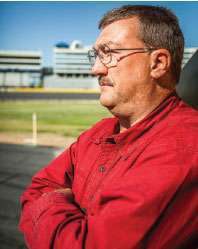
Concord, North Carolina
Year started 1999
Markets served Self performs demolition, mass and light grading, water and sanitary sewer, storm drain, concrete, curb and gutter, stone base and asphalt paving.
Number of employees 80
Annual sales $14 to $15 million
“I enjoyed construction so much it changed my path in life. ”






